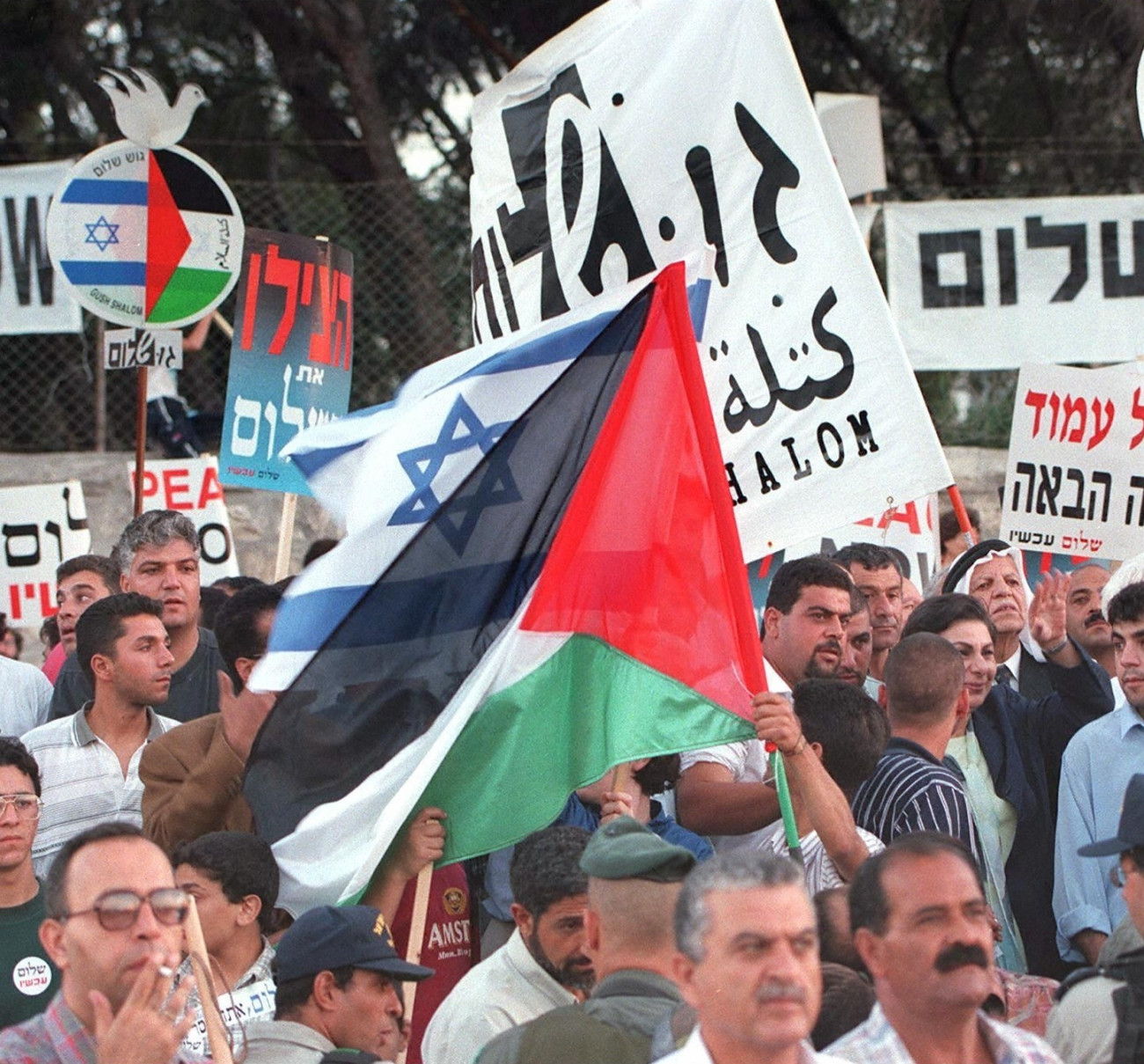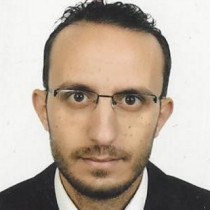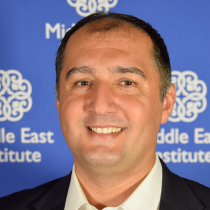

Introduction
The negotiated pause in hostilities in war-ravaged Gaza this past week raised restrained hopes in some capitals around the world that the temporary truce and associated hostage-prisoner exchanges might lay the groundwork for talks on a more enduring cease-fire. Yet many experts cautioned that such hopes were premature. When this truce expired on Friday morning and the fighting resumed, that caution proved astute and underscored that peace remains a distant prospect for now. Nevertheless, the renewed violence, continued humanitarian catastrophe, and the war’s threat to wider regional stability accentuate the pressing need for a political solution to not just the eight-week-old Israel-Hamas war but to the wider Israeli-Palestinian conflict.
It is time to start thinking now — even as the war rages on — about what a final peace settlement should look like and how to get there so that the right actors and elements are in place when a brief window for talks opens up. What would it take to start a new Israeli-Palestinian peace process that could actually have the prospect for enduring success? How and when will it be possible to bring the two sides to the negotiating table? Who should be involved? And what would be the proper sequencing and structure of such talks to ensure a fair, inclusive, and fruitful process? MEI has asked a group of regional and U.S. experts to weigh in on these and related questions.
Photo by MENAHEM KAHANA/AFP via Getty Images
Viewpoints
-
Randa Slim
Randa Slim

Pain, politics, and donor pledges: What must be overcome to bring Israelis and Palestinians to the table
The Israelis and Palestinians are locked in their respective griefs. Israelis are mourning the 1,200 deaths from Hamas’ Oct. 7 terrorist attack and are focused on setting their hostages free. The Palestinians are mourning the tens of thousands of Gazans killed in Israel’s military response, including more than 5,000 children. Every family in the Gaza Strip has been directly or indirectly affected by the violence. At this stage, it is hard to expect either party to think beyond survival, a fact further complicated by the Israeli government’s resumption of the onslaught on Gaza.
Egyptian and Qatari mediators are pressing for additional temporary extensions of the truce, which was in place for a week before expiring on Friday. Absent that, the Israeli bombing of Gaza could proceed for an indeterminate period, perhaps interspersed with sporadic short-term truces to enable the flow of humanitarian aid into the strip.
To date, there is no clear endpoint for this war. Israel’s objective of toppling Hamas is “a pretty large order,” according to the new chairman of the United States Joint Chiefs of Staff, Gen. Charles Q. Brown. For Hamas, surviving the Israeli onslaught, even if some of its leaders and rank and file are killed, would be victory enough. At some point, a mounting civilian death toll will increase pressure on the U.S. president, Israel’s prime ally, to push Israeli officials to stop the fighting.
Once the hostilities end, the immediate priority will focus on Gaza’s governance: Who will provide security? Where will the Palestinian internally displaced persons (IDPs) be housed? Who can and how will they be able to surge humanitarian aid? And who will fund the reconstruction? Washington-based conflict resolution expert Daniel Serwer has been writing interesting analysis on day-after security scenarios. Arab Gulf Cooperation Council (GCC) governments will likely be the largest funders of Gazan reconstruction; it is hard to imagine the U.S. Congress allowing any U.S. taxpayer money to be allocated for this purpose. The majority of potential funders, including some GCC members, will surely insist that reconstruction be linked to a political negotiations process between Israelis and Palestinians on a final status peace deal. Such a negotiations process has not existed for years, even as Israel pursued normalization with a number of Arab countries.
A serious political negotiations process between Israelis and Palestinians will require addressing the issue of leadership on both sides. Israeli Prime Minister Benjamin Netanyahu and his right-wing allies in the coalition government are opposed to the establishment of an independent Palestinian state. Even if his government were to fall soon, as many political analysts predict, it is not clear that Netanyahu’s successor will be of a different mind on the issue of a Palestinian state. The same goes for the Israeli public. Israeli political scientist Dahlia Scheindlin argues “history has repeatedly shown, especially in recent decades, [that] episodes of war or extreme violence like the current one have only reinforced a rightward tilt in Israeli politics.”
On the Palestinian side, who will emerge as the next leader is also a complicated issue. A weak and corrupt Fatah-led Palestinian Authority (PA) in the West Bank that is increasingly perceived as incapable of and unwilling to protect Palestinians from Israeli violence can no longer be the sole representative of the Palestinians at the negotiation table. A revitalized PA to govern Gaza once the fighting is over, as the U.S. administration advocates, is not a realistic proposal. Hamas’ Oct. 7 attack and its rejection of a two-state solution make its participation in future negotiations problematic to say the least. The fact that it is defined as a terrorist organization by most Western countries is not by itself enough of an exclusion criterion: That was the case with the Palestinian Liberation Organization (PLO) in the past. But like when the PLO changed its national charter, Hamas must also abandon its stated objective of destroying Israel, and rewrite its charter accordingly, before it is accepted as a negotiations partner. Neither the PA, led by Fatah, nor Hamas can claim to be the sole representative of the Palestinian people. Between 2007 and 2018, there were seven failed Fatah-Hamas reconciliation efforts. At the same time, the Palestinians in Gaza have been denied the right to choose their leadership since 2006, when Hamas won elections in the strip; Mahmoud Abbas was elected president of the PA in 2005, succeeding Yasser Arafat, but has not stood for popular election since then. It is not clear yet how the Oct. 7 Hamas-led attack and its disastrous aftermath for Israelis and Palestinians alike will change these internal Palestinian dynamics. Statements by Palestinian prisoners who were recently released from Israeli jails as part of this past week’s hostage-prisoner exchange deal clearly indicate whom they credit for their freedom — it is not the PA.
Randa Slim is the Director of the Conflict Resolution and Track II Dialogues Program at the Middle East Institute and a non-resident fellow at the Johns Hopkins University School of Advanced and International Studies (SAIS) Foreign Policy Institute.
-
Moien Odeh
Moien Odeh

Palestinians must hold elections before entering into peace talks
One of the main obstacles to a peace agreement between Israel and the Palestinians has always been the international community’s propensity to decide without broader Palestinian input who represents the Palestinians and whom it will talk to and fund. Major international actors did this during the Oslo talks, when they negotiated only with the Palestinian Liberation Organization, even though this group was never elected by the Palestinian people; and they did it again after the 2006 parliamentary elections and the Palestinian split, when their sole counterpart in the talks was the Palestinian Authority in Ramallah.
Since the establishment of the PA in 1994, Palestinians have held two presidential and two parliamentary elections; the last ones in 2005, for the presidency (which was boycotted by Hamas), and 2006, for parliament (in which Hamas won the majority). No Palestinian elections were held prior to the signing of the Oslo Accords (1993 and 1995). Moreover, the majority of Palestinians — both those living in the diaspora and Arab Palestinians in Israel — never voted in any elections. (Many Palestinians in Gaza and the West Bank also sat out all of these elections, but this was by choice.) For more than a decade now, the Palestinian leadership has drawn its legitimacy from everyone except the Palestinian people themselves. This “leadership” is accepted by Israel and the international community, but it has no legitimacy or credibility on the Palestinian street. This is the “leadership” the international community has talked to for years in an effort to build peace between Israel and the Palestinians — with predictable consequences.
If the international community and the American administration are serious about any future peace talks, they need to make sure that no negotiations take place before the holding of free elections; and those elections need to be open to all Palestinian parties and fractions, with voting rights extended to Arab Palestinians in Israel as well as the core of the Palestinian refugees (in Lebanon). Only after the election results are tabulated and respected and the winner recognized by all sides — including Israel — can the international community start talking to all Palestinians, including those who lost the vote, about incentives to enter into a peace process with a clear timeline and a clear commitment to fair results.
In turn, the international donor community should understand that over the years it has inadvertently created a “peace business” and a “conflict business” for different sides in Palestinian society. For about three decades, the main Palestinian beneficiaries of these international donations have been the disproportionately well-paid directors and workers of non-profit organizations as well as senior officials, while regular Palestinians have hardly seen any positives coming from these foreign funds pouring in. To rectify this, the donor community must build a different system that much more directly targets regular Palestinian people over continuing to support ineffectual non-profit organizations and paying the inflated salaries of senior officials. At the same time, incentives should not only be economical: An over-reliance on throwing money at a problem has and will continue to foster a corrupt leadership and inspire the rise of new groups intent on fighting against Israel and this new system.
Moien Odeh is an international human rights lawyer, a research and teaching assistant, and PhD student at George Mason University, Carter School for Peace and Conflict Resolution.
-
Nimrod Goren
Nimrod Goren

From fighting to engagement: A pro-peace Israeli sequence for advancing the two-state solution
Moving from the current war in Gaza to a process that advances a two-state solution is a necessity and should be a priority. As dire as these days are, there is no long-term alternative for Israelis and Palestinians other than the creation of an independent Palestinian state that neighbors Israel and lives in peace with it. Those in both societies as well as in the international community who seek peace should, thus, take the lead on achieving this, promote a positivist discourse, and restore hope.
Progress toward peace requires a gradual and sequential approach that takes into account what will need to be achieved in each of the phases that lie ahead — fighting, transition, and engagement. From a pro-peace Israeli perspective, bringing about a lasting Israeli-Palestinian agreement will require the following sequence of events to take place:
The fighting phase, in which the Israel-Hamas war continues in high intensity, should produce an outcome whereby Hamas no longer governs the Gaza Strip nor poses a significant security threat to Israel. For as long as hostilities persist, however, the international community should not stop emphasizing the need for and relevance of a two-state solution to the conflict, and it must make a multilateral commitment to advancing that solution by presenting a coordinated diplomatic horizon. Quiet engagement between Israel and Arab countries should continue — mostly on security-related affairs and via track-two channels, while keeping intact the current level of formal ties. Inside Israel, public attitudes supportive of political change and ones that reassess concepts related to the Israeli-Palestinian conflict should be fostered and transformed into new political strategies and narratives.
The transition phase, during which the governance and security architecture of the Gaza Strip will be remade (possibly in parallel to the continuation of some low-intensity fighting), must lead to political changes in both Israel and the Palestinian Authority. Israelis will need to feel an increased sense of security, enabling large numbers of those evacuated from areas near Gaza and the Lebanon border to return to their homes. Israeli political leaders and civil society organizations should introduce and advance new pro-peace concepts and ideas on how to deal with the Palestinian issue. A new and moderate Israeli coalition should take office. Meanwhile, regional and international actors should advance a revitalization of the PA and the reconstruction of Gaza. Public engagement between Israeli and Arab leaders should be resumed, bilaterally and via regional forums, for joint policy planning and security coordination. Finally, the international community should work to develop a package of peace incentives for Israelis and Palestinian, as envisioned by the Peace Day Effort launched before the war, in September 2023.
The engagement phase, in which Palestinian reunification has been achieved and Israel is already governed by a coalition willing to resume talks with a revitalized PA, should lead to a resumption of peace negotiations with increased involvement and investment by the international community. The next U.S. administration, which will have assumed office by then, should prioritize Israeli-Palestinian peacemaking, and a multilateral peace conference should be convened, including Israel and the Palestinian side, leading to the formation of a new international mechanism to advance peace (instead of the defunct Quartet). The newly crafted international incentives package should be introduced and marketed effectively. Regional cooperative groupings and projects — including ones with Palestinian participation — should be resumed and expanded. Direct Israeli-Palestinian talks should recommence and intensify, both at the official and “people-to-people” levels. Lastly, Israel-Saudi Arabia normalization should also be advanced, with progress toward Israeli-Palestinian peace being an explicit condition for a breakthrough.
Dr. Nimrod Goren is the Senior Fellow for Israeli Affairs at the Middle East Institute, President of Mitvim - The Israeli Institute for Regional Foreign Policies, and Co-Founder of Diplomeds - The Council for Mediterranean Diplomacy.
-
Brian Katulis
Brian Katulis

What the US can do to restart the Middle East peace process
The question of what the United States can do to restart the Middle East peace process is both ahead of its time and simultaneously long overdue.
On the one hand, the Gaza war and the broader tensions that have engulfed the Middle East suggest it will be a long time before negotiators on both sides are willing to sit down to talk peace. But on the other hand, many of the challenges and threats that the world did not adequately address in the past came roaring back to life with the Hamas attack against Israel on Oct. 7. The Israel-Hamas war, thus, served as a reminder that the unresolved Israeli-Palestinian conflict remains a threat to regional and global security, and the United States has a strong interest in seeing a lasting, sustainable resolution to the conflict.
The current conflict is unlikely to be settled any time soon, and how the war is prosecuted in the meantime will reshape political dynamics and possibilities in unexpected ways. But there are at least three major steps the U.S. can take now to prepare for a comprehensive effort to restart the Middle East peace process:
1. Increase direct U.S. diplomacy and engagement with the Palestinian Authority and the Palestinian people. The Biden administration has restated the goal of achieving a “two-state solution,” and this will not be possible without a Palestinian governing authority that has the will and capacity to deliver for its people. During the Oslo process in the 1990s, robust American engagement supported the PA, and the U.S. worked with the Palestinian people to aid in the development of Palestinian society, including programs to help strengthen governance, law and order, and education. One key building block for restarting the peace process in the coming years will be strengthening U.S. engagement with broader sectors of Palestinian society, a task that is easier said than done in the current security and political context. This means building back better direct U.S. diplomatic outreach, including a consulate or other diplomatic presence, and working with other countries in the region to offer the needed support to help the eventual state of Palestine to stand on its own.
2. Form a regional contact group to offer support to efforts to make a Palestinian state a reality. Another step the Biden administration could take to move toward a more strategic posture is to create a regional contact group with select Arab partners such as Egypt, Jordan, Qatar, Saudi Arabia, the United Arab Emirates, and the PA. Similar to the groups formed in the 1990s during the Balkan wars, this regional grouping could serve as a force multiplier for U.S. diplomacy, and it could help achieve some key short- and longer-term goals, including:
-
Coordinating actions on addressing short-term urgent issues such as enhancing civilian protection, delivering humanitarian aid, and securing the release of hostages.
-
Supplementing ongoing military and intelligence coordination efforts between America and its Arab partners and filling gaps in current U.S. diplomatic engagement with the region.
-
Sending coordinated messages to Iran and its regional network to deter a wider escalation.
-
Bridging policy gaps between the United States and some of its key regional partners.
-
Setting a framework for regional coordination on long-term steps on post-conflict reconstruction, reviving a two-state solution, and moving toward a new regional environment that advances some of the signature pre-Oct. 7 efforts like Israeli-Saudi normalization and the India-Middle East-Europe Economic Corridor (IMEC) project announced at this year’s G20.
-
Sharing the burden with America as it confronts wider geostrategic challenges such as climate change, China, and the Russo-Ukrainian war.
3. Create a new paradigm for U.S.-Israel security cooperation that prioritizes preserving and protecting a two-state solution and enhances regional cooperation. For decades, the U.S.-Israel bilateral relationship has been grounded in strong military and security cooperation between the two countries. An important strategic shift that should be made is to evolve this paradigm toward one in which Israel is much more integrated with the broader regional security architecture the United States has helped build. Such a shift has become easier to make since Israel moved into the U.S. Central Command’s area of responsibility in 2021. By building a more cohesive and integrated regional security system, the U.S. can work with its full range of partners in the Middle East to deter threats from forces like Iran and its network of proxies who oppose regional integration and normalization efforts and work actively against a two-state solution.
These three steps are just the first of several necessary ingredients to prepare for a more comprehensive approach to advancing Middle East peace.
Brian Katulis is a Senior Fellow and Vice President of Policy at the Middle East Institute.
-
-
Paul Salem
Paul Salem

The key role regional Arab states must play in any Palestinian-Israeli peace negotiations
The role of the Arab states, particularly those of the Gulf Cooperation Council (GCC), will be key to advancing toward a two-state solution. Unlike in the early 1990s, when both the Madrid peace process and the Oslo Accords were being negotiated, today the preponderance of influential Arab states have either already entered into peace/normalization agreements with Israel or are moving in that direction. The strategic opportunity here is that Israel — or a new Israeli government — would be engaging in negotiations within the context of a transformed region, and any Palestinian state that emerges in the current context will be well embedded in a powerful coalition of moderate Arab states.
The Arab countries that wish to see the emergence of an independent Palestine and a resolution to this long-running and devastating conflict, should step up to be full and bold partners in this effort. This will not only help achieve a livable future for both Palestinians and Israelis but also help stabilize the region as well as limit the appeal of spoilers, such as Iran, its proxy allies, or other radical Islamist groups, all of whom have thrived off of this unresolved crisis for decades.
Indeed, Qatar is already playing a key mediating role — along with Egypt — in helping negotiate detainee exchanges between Hamas and Israel, achieve temporary ceasefires, and enable humanitarian aid to enter Gaza. Qatar and Egypt will also be key players in trying to find an end to this war, sooner rather than later. A wider group — Saudi Arabia, the United Arab Emirates, Qatar, Jordan, and Egypt, what we might term the GCC3+2 — appear to be looking a bit farther down the road.
A critical idea is to bolster the Palestinian Authority in ways that would enable it to regain capacity, play a role in post-conflict governance in Gaza, improve its performance and standing in the West Bank, and present a credible partner for potential peace negotiations. The mechanism would be to push for the appointment of a credible and effective technocratic cabinet for the PA led by a credible prime minister, even if the aging Mahmoud Abbas might remain for now as a figurehead. This is in some ways a revival of the earlier approach to push to the forefront then-Prime Minister Salam Fayyad, who made important steps forward in peace talks before he was squeezed out of power a decade ago. Appointing a new and capable prime minister would not only represent an important step toward reviving the PA but would also be a promising signal of increasing Arab-PA cooperation on longer-term goals.
For the past several decades, the Palestinians were left largely on their own to negotiate with the much stronger Israeli and American sides. Not surprisingly, they were both too weak to get the concessions they wanted and too politically vulnerable to accept what was on offer. An engaged, proactive, and peace-oriented Arab role in any new negotiations should provide fresh possibility, not only for the Palestinians but for the next Israeli government interested in exploring a solution to the conflict.
Paul Salem is president and CEO of the Middle East Institute. He focuses on issues of political change, transition, and conflict as well as the regional and international relations of the Middle East.
-
Emiliano Alessandri
Emiliano Alessandri

Europe’s path to a diplomatic role in the Middle East crisis is an uphill road
Turning the ongoing regional crisis into an opportunity for reviving the Middle East peace process is daunting but necessary. Israel should be the first to recognize that the defeat of Hamas cannot be achieved on the battleground alone and that its security ultimately depends on making progress toward a two-state solution. That is why the idea of a European Union-backed “peace conference,” which received a generic endorsement at a European Council meeting in late October, seemed worth exploring.
Yet, just a month later, an already uphill road has become even steeper. The recent trip to the region by Prime Ministers Pedro Sanchez of Spain and Alexander De Croo of Belgium ended with a diplomatic incident. The trip was aimed at laying the groundwork for Europe’s peace initiative (Spain and Belgium hold the Presidency of the Council of the EU until the end of this year and the first half of 2024, respectively). At a joint press conference at the Rafah border crossing before returning to Europe, however, Sanchez deplored “the indiscriminate killing of civilians” and hinted that Spain might unilaterally recognize a Palestinian state if the EU will not do so. Israel summoned the Spanish and Belgian ambassadors for admonishment shortly thereafter.
Israel also backed out from a Union for the Mediterranean forum in Barcelona this Monday as the Gaza war was put on the agenda of what had originally been conceived as a commemorative event. While the meeting may have helped to “bridge the gap” between the EU and Arab countries, to use the words of Jordanian Foreign Minister Ayman Safadi, it also further brought to the surface intra-European differences, with Germany and others feeling uncomfortable with initiatives that may undermine Israel’s position.
Rather than deterring further action, recent setbacks should lead to a more careful approach. The EU should leverage its engagement with Arab states to nudge — as opposed to antagonize — Israel. It should also coordinate its actions with the United States as much as possible.
Building on the momentum created by the Qatar-brokered hostage release deal, the Spanish and Belgian EU presidencies should garner international support for: an Arab Peace Initiative II leading to talks between the parties, with the EU providing complementary dialogue formats; a plan for post-war Gaza in which the strip is put ad interim under international control (if not under the United Nations, then under an Arab consortium), with a view to having both Gaza and the West Bank under a common Palestinian Authority as soon as circumstances allow; the revitalization of the PA, a process hinging on the neutralization of Hamas as both a military and political actor but also on Israel addressing the grievances that are behind the appeal of Palestinian extremism.
The EU should exert pressure on the parties by pursuing a conditionality-based approach to both its assistance to the Palestinians and the bloc’s economic and trade relationship with Israel. The EU should convey that a resumption of diplomatic talks is becoming a “strategic imperative” for Europe. The crisis has resulted in a sharp increase in the number of violent incidents driven by antisemitism and Islamophobia. And it has already complicated cooperation among EU member states in areas ranging from foreign policy to migration management.
Emiliano Alessandri is a Non-Resident Scholar with MEI and an expert on Euro-Mediterranean relations with a focus on North Africa.
-
Alex Vatanka
Alex Vatanka

An Israeli-Palestinian peace process would present Iran with a difficult choice
For Iran, the Israel-Hamas war brings both threats and opportunities. The main threat is the total destruction of the military capacity of Hamas, an important member of the so-called “Axis of Resistance” led by Tehran. The prevention of this scenario has been at the heart of Iran’s regional diplomatic efforts since Oct. 7. The opportunity side is two-pronged. First, in the short term, Tehran has delighted in what it sees as the emergence of a new anti-Israel posture in the Islamic world and much of the Global South. But the ongoing conflict also provides Tehran with a far more meaningful opportunity: namely, to fundamentally shift its position toward Israel, a reality that should not be lost on the international community.
Above all, Iran sees this as a moment of revenge against Israel. The Iranian regime blames Israel not only for numerous assassinations on its soil over the last decade but considers the Jewish state as the principal force that drives international efforts to keep Iran isolated. In Tehran’s eyes, its years of financial and military support for Hamas were paid back with the attack on Oct. 7, which Iranian officials hailed as the moment Israel’s invincibility ended. Tehran has, thus, spent the last seven weeks striving to pressure both Israel and the United States to limit the response to Hamas, hoping that the group’s military wing in Gaza will not be entirely eliminated. That said, Iran and its main Arab militant ally, Lebanese Hezbollah, have made it clear that they will not enter the war directly to save Hamas.
To help Hamas on the diplomatic front, Tehran has effectively had to move toward the regional mainstream on the question of how to stop the conflict. True to form, Iranian rhetoric has been overblown: for instance, calling for the creation of an “Islamic Army” to confront Israel, or claiming to want to recruit and deploy volunteers to Gaza, although there is no evidence of Iranians joining the war. But in practice, Iranian calls for action against Israel have had to pass a basic reality check. In his speech last month to the Organization of Islamic Cooperation, in Riyadh, President Ebrahim Raisi called for Muslim action against Israel but never delivered any ultimatums. Supreme Leader Ali Khamenei first asked for Islamic countries to cut relations with Israel only later to plea merely for a suspension in ties. In short, Tehran is careful not to overplay its hand. And it clearly does not want to let the Gaza war become a point of contention with Arab countries that maintain diplomatic ties with Israel, like the United Arab Emirates — an important trading partner for Iran.
This takes us back to the opportunity for Iran to fundamentally shift its policy on Israel. Since 1979, the Islamists in Tehran have refused to recognize Israel’s right to exist. During the presidency of Mohammad Khatami (1997-2005), Tehran hinted at accepting a political resolution that was acceptable to the Palestinians but without ever openly offering to recognize Israel.
Today, despite widespread anger across the region at Israel’s war in Gaza, Tehran must factor in that the grand Islamic anti-Israel coalition it has hoped for is unlikely to materialize even after the war is over. Hence Iran’s militant stance against Israel will continue to isolate it if and once the international community begins to push for renewed Israeli-Palestinian talks.
The alternative for Tehran is to accept Israel but without necessarily declaring so openly. In fact, Iran has already taken a step in this direction during the ongoing Gaza war. In October, Tehran voted in favor of an Arab motion for a ceasefire between Israel and Hamas, a step that basically expressed Tehran’s reluctant admission of the Israeli state as a reality. The international community, particularly the Arab states that Tehran is eager to work with, need to encourage Iran to adjust its policies for it to be able to play a constructive role inside an Israeli-Palestinian peace process as opposed to simply acting as a spoiler from the outside.
Should a peace process follow this latest war, most likely to be led by the U.S. and the Arab states, Iran will have a hard choice to make. The Iranians no doubt know the high geopolitical costs associated with acting as a spoiler. Thirty years ago, Iran refused to accept the Oslo Accords, a decision that only deepened Tehran’s image as a radical actor and marginalized Iran from the rest of the region. Iran can repeat the same mistake and double-down on upholding its Axis of Resistance against Israel, or it can begin to look for ways to work with the majority in the region that seek a feasible political settlement to the Israeli-Palestinian conflict.
Alex Vatanka is the director of the Iran Program at the Middle East Institute and a Senior Fellow with MEI’s Black Sea Program.










